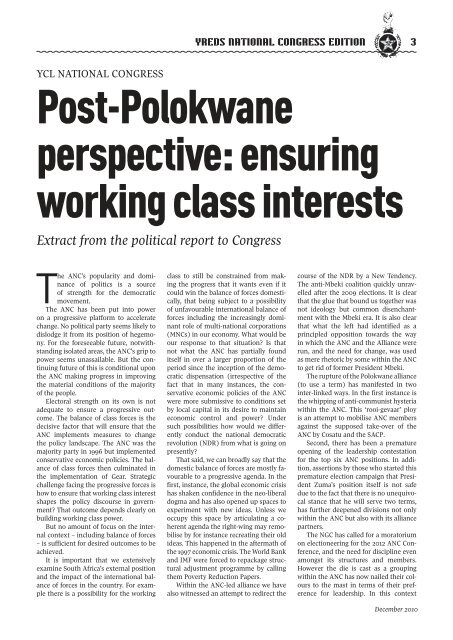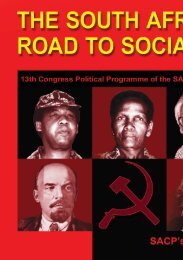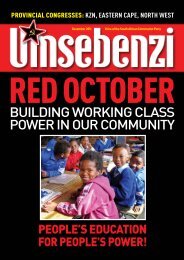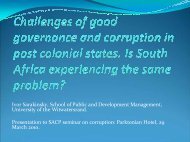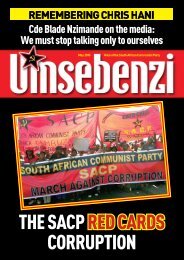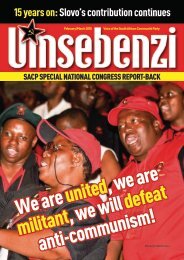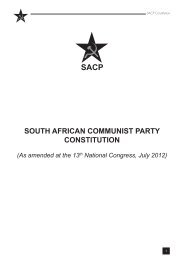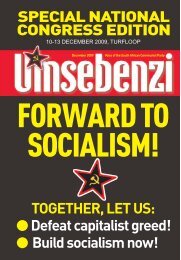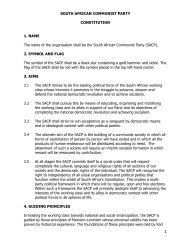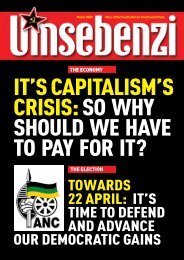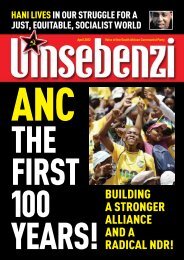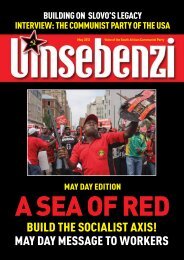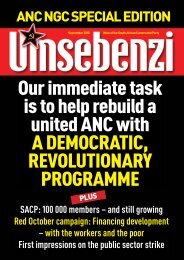YCL CONGRESS EDITION - South African Communist Party
YCL CONGRESS EDITION - South African Communist Party
YCL CONGRESS EDITION - South African Communist Party
Create successful ePaper yourself
Turn your PDF publications into a flip-book with our unique Google optimized e-Paper software.
<strong>YCL</strong> NATIONAL <strong>CONGRESS</strong><br />
Post-Polokwane<br />
perspective: ensuring<br />
working class interests<br />
Extract from the political report to Congress<br />
The ANC’s popularity and dominance<br />
of politics is a source<br />
of strength for the democratic<br />
movement.<br />
The ANC has been put into power<br />
on a progressive platform to accelerate<br />
change. No political party seems likely to<br />
dislodge it from its position of hegemony.<br />
For the foreseeable future, notwithstanding<br />
isolated areas, the ANC’s grip to<br />
power seems unassailable. But the continuing<br />
future of this is conditional upon<br />
the ANC making progress in improving<br />
the material conditions of the majority<br />
of the people.<br />
Electoral strength on its own is not<br />
adequate to ensure a progressive outcome.<br />
The balance of class forces is the<br />
decisive factor that will ensure that the<br />
ANC implements measures to change<br />
the policy landscape. The ANC was the<br />
majority party in 1996 but implemented<br />
conservative economic policies. The balance<br />
of class forces then culminated in<br />
the implementation of Gear. Strategic<br />
challenge facing the progressive forces is<br />
how to ensure that working class interest<br />
shapes the policy discourse in government?<br />
That outcome depends clearly on<br />
building working class power.<br />
But no amount of focus on the internal<br />
context – including balance of forces<br />
– is sufficient for desired outcomes to be<br />
achieved.<br />
It is important that we extensively<br />
examine <strong>South</strong> Africa’s external position<br />
and the impact of the international balance<br />
of forces in the country. For example<br />
there is a possibility for the working<br />
class to still be constrained from making<br />
the progress that it wants even if it<br />
could win the balance of forces domestically,<br />
that being subject to a possibility<br />
of unfavourable international balance of<br />
forces including the increasingly dominant<br />
role of multi-national corporations<br />
(MNCs) in our economy. What would be<br />
our response to that situation? Is that<br />
not what the ANC has partially found<br />
itself in over a larger proportion of the<br />
period since the inception of the democratic<br />
dispensation (irrespective of the<br />
fact that in many instances, the conservative<br />
economic policies of the ANC<br />
were more submissive to conditions set<br />
by local capital in its desire to maintain<br />
economic control and power? Under<br />
such possibilities how would we differently<br />
conduct the national democratic<br />
revolution (NDR) from what is going on<br />
presently?<br />
That said, we can broadly say that the<br />
domestic balance of forces are mostly favourable<br />
to a progressive agenda. In the<br />
first, instance, the global economic crisis<br />
has shaken confidence in the neo-liberal<br />
dogma and has also opened up spaces to<br />
experiment with new ideas. Unless we<br />
occupy this space by articulating a coherent<br />
agenda the right-wing may remobilise<br />
by for instance recreating their old<br />
ideas. This happened in the aftermath of<br />
the 1997 economic crisis. The World Bank<br />
and IMF were forced to repackage structural<br />
adjustment programme by calling<br />
them Poverty Reduction Papers.<br />
Within the ANC-led alliance we have<br />
also witnessed an attempt to redirect the<br />
course of the NDR by a New Tendency.<br />
The anti-Mbeki coalition quickly unravelled<br />
after the 2009 elections. It is clear<br />
that the glue that bound us together was<br />
not ideology but common disenchantment<br />
with the Mbeki era. It is also clear<br />
that what the left had identified as a<br />
principled opposition towards the way<br />
in which the ANC and the Alliance were<br />
run, and the need for change, was used<br />
as mere rhetoric by some within the ANC<br />
to get rid of former President Mbeki.<br />
The rupture of the Polokwane alliance<br />
(to use a term) has manifested in two<br />
inter-linked ways. In the first instance is<br />
the whipping of anti-communist hysteria<br />
within the ANC. This ‘rooi-gevaar’ ploy<br />
is an attempt to mobilise ANC members<br />
against the supposed take-over of the<br />
ANC by Cosatu and the SACP.<br />
Second, there has been a premature<br />
opening of the leadership contestation<br />
for the top six ANC positions. In addition,<br />
assertions by those who started this<br />
premature election campaign that President<br />
Zuma’s position itself is not safe<br />
due to the fact that there is no unequivocal<br />
stance that he will serve two terms,<br />
has further deepened divisions not only<br />
within the ANC but also with its alliance<br />
partners.<br />
The NGC has called for a moratorium<br />
on electioneering for the 2012 ANC Conference,<br />
and the need for discipline even<br />
amongst its structures and members.<br />
However the die is cast as a grouping<br />
within the ANC has now nailed their colours<br />
to the mast in terms of their preference<br />
for leadership. In this context<br />
December 2010


